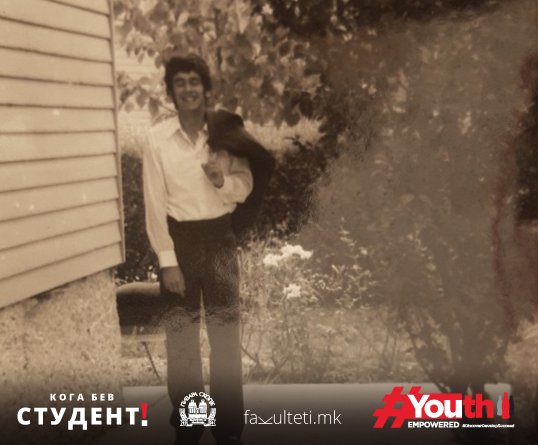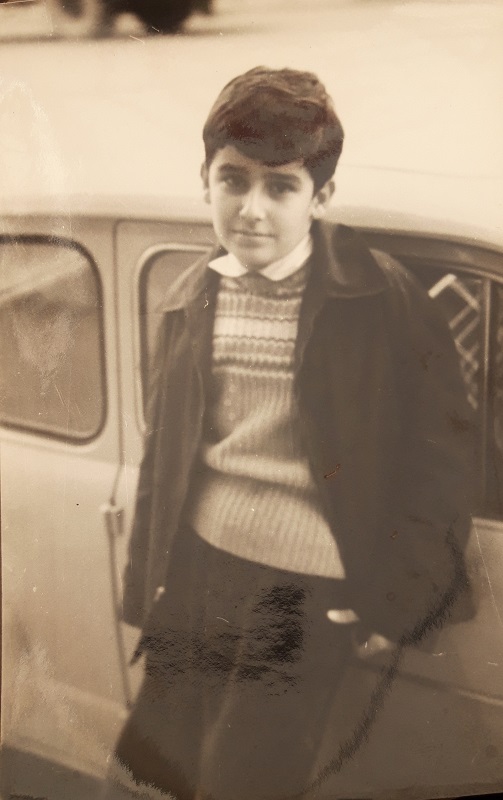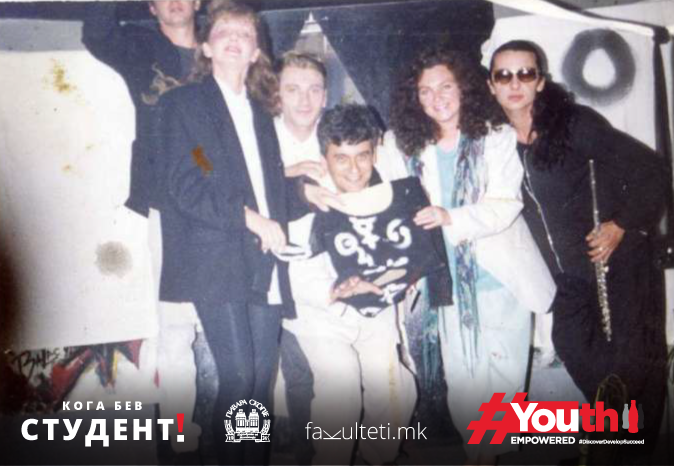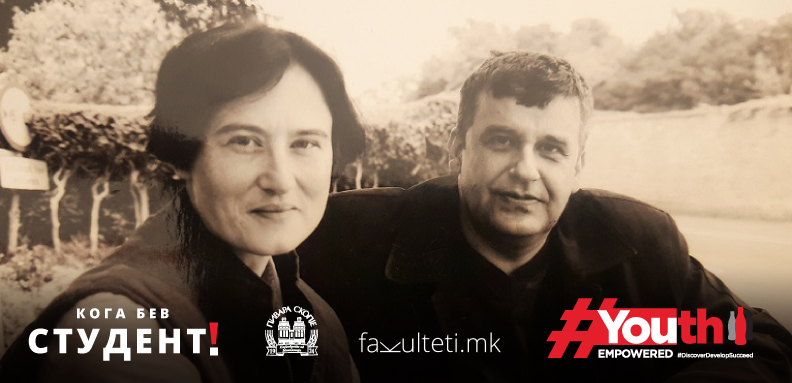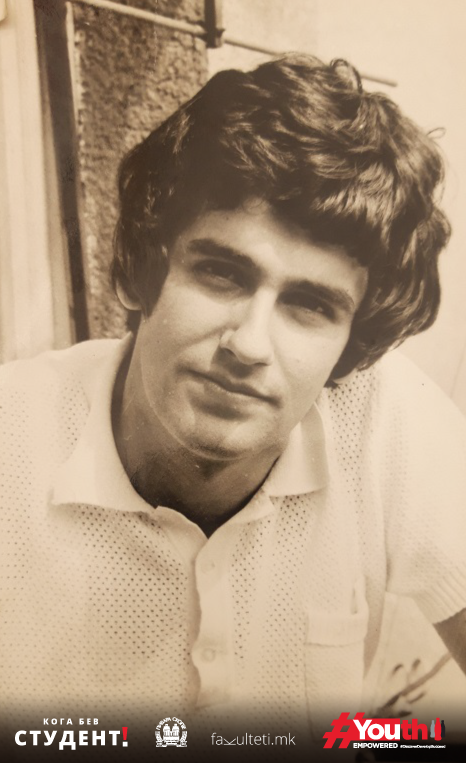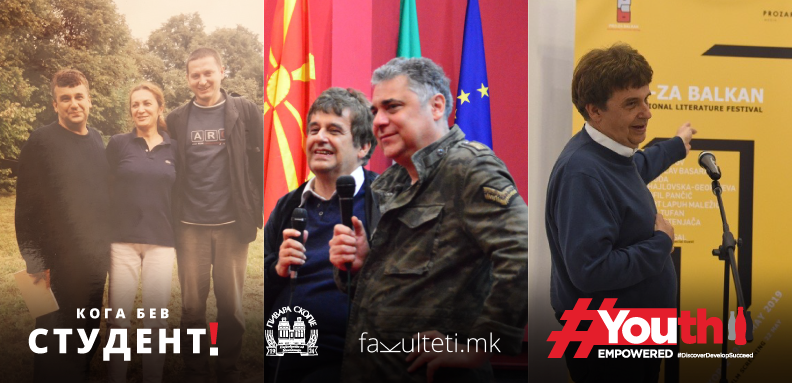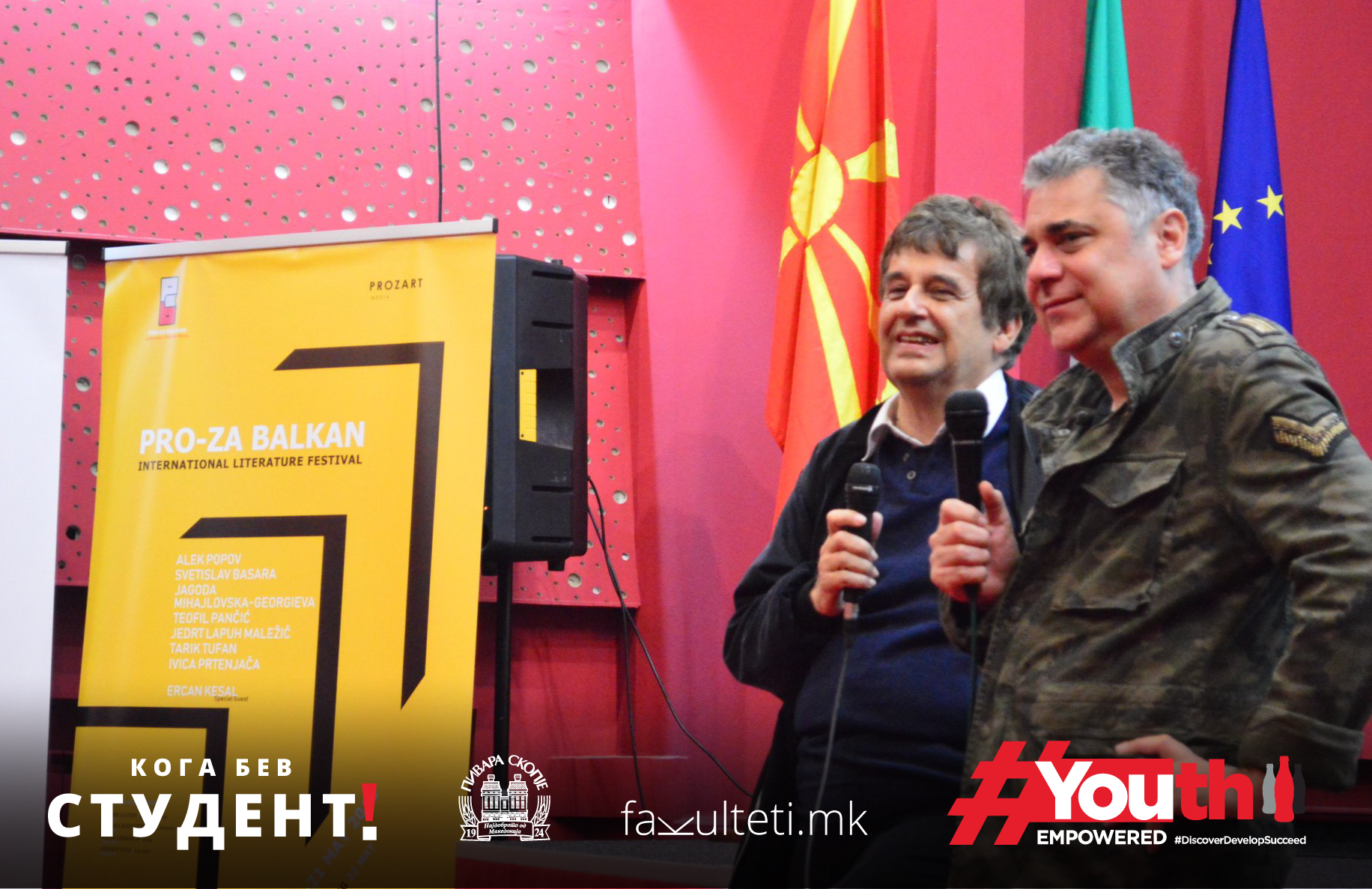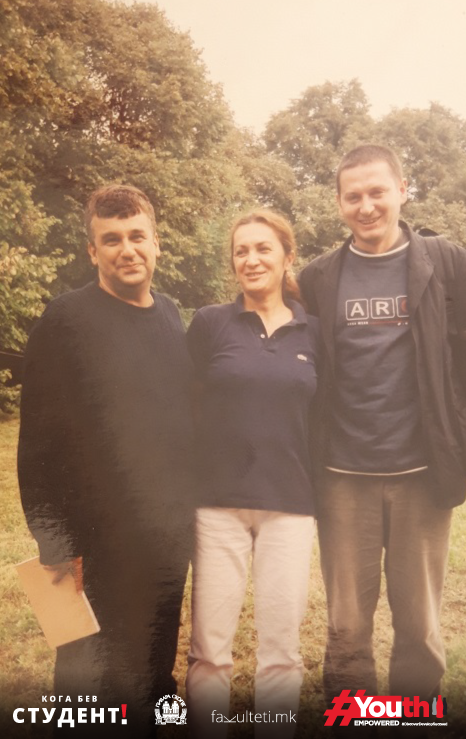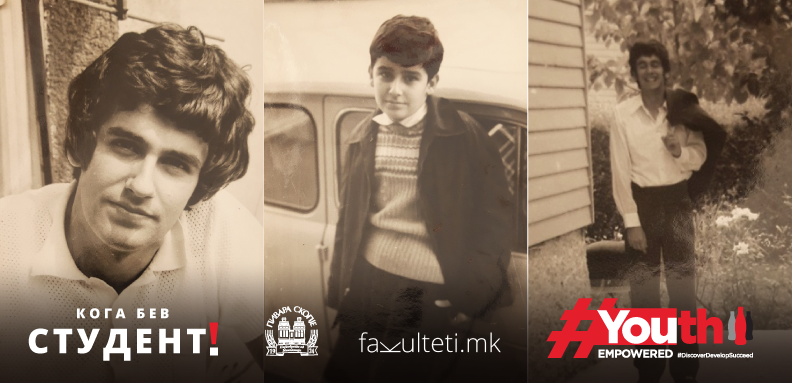
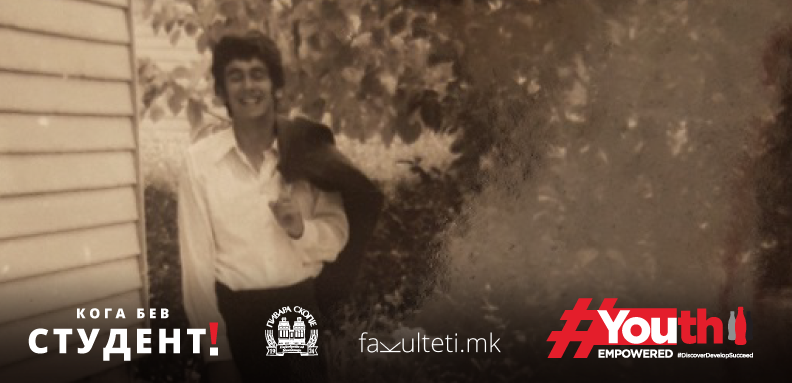
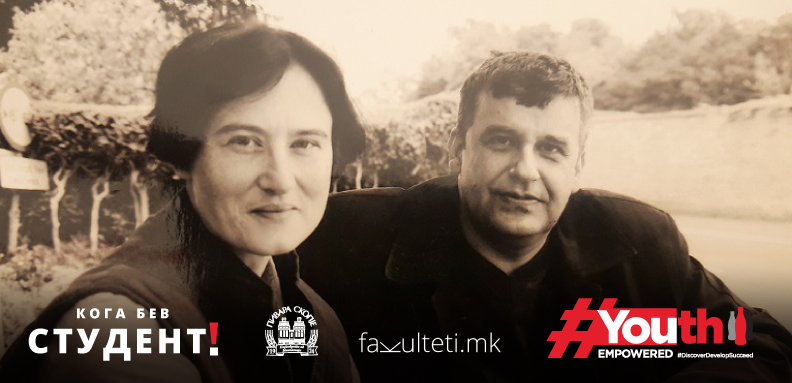
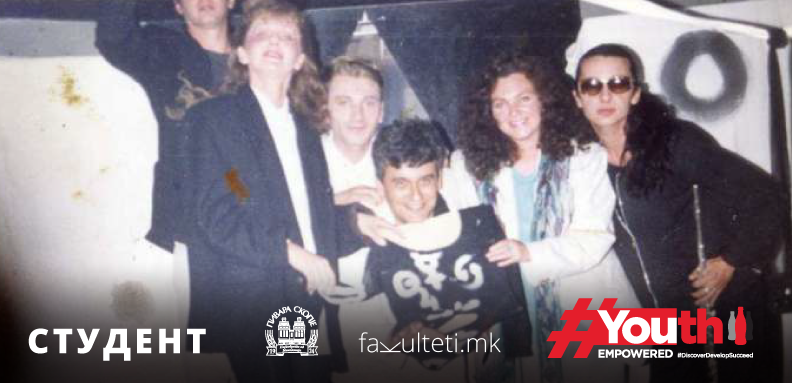
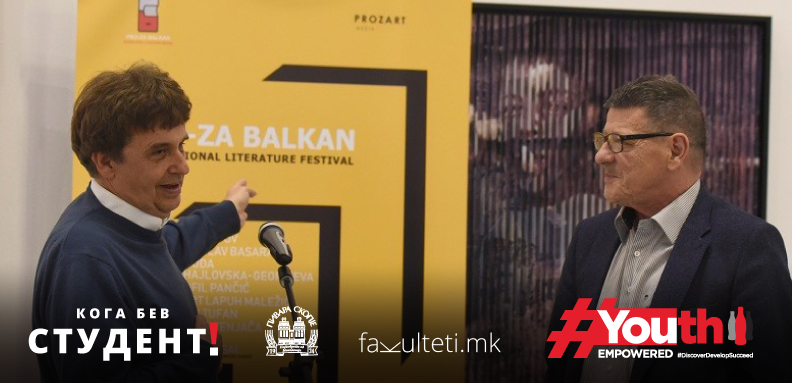
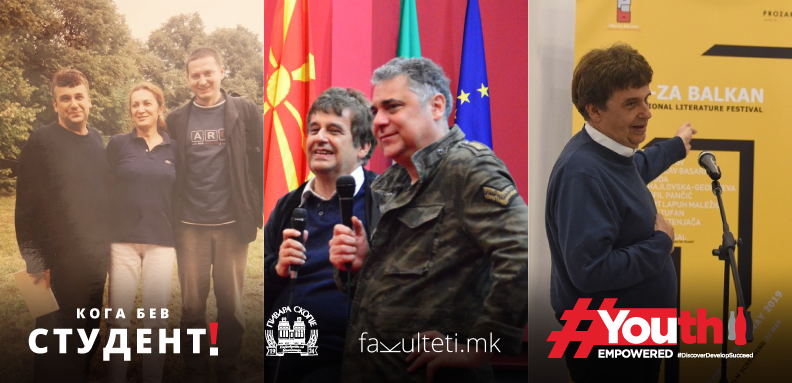
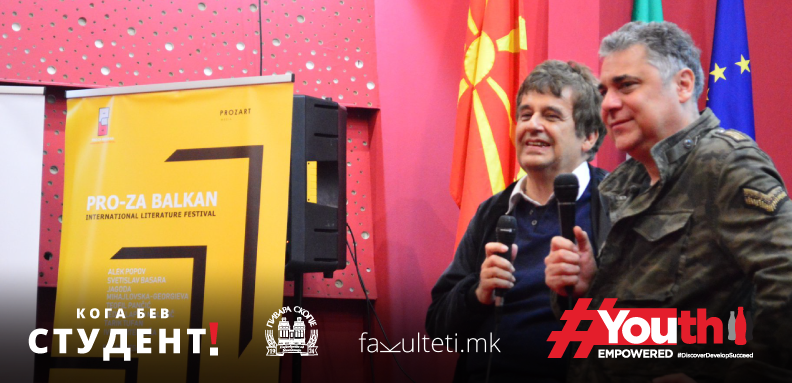
WHEN I WAS A STUDENT WITH ALEKSANDAR PROKOPIEV: “I WAS AMBITIOUS IN MY FRESHMAN YEAR, BUT THEN I GOT INTO ROCK ‘N’ ROLL AND THE 10s MELTED AWAY”
“Every Friday we’d organize gatherings of current and former comparative literature students. We’d discuss various topics related to literature. I was living well because I was making money, from articles published in student magazines (they paid us great at the time) and performances in Belgrade clubs. I was a little bit like a god,” remembers the writer and university professor in the student days story that Fakulteti.mk and Pivara Skopje will tell you together.
Writer and university professor Alexander Prokopiev has many stories to tell. He made friends with books at a young age, when he literally used them to build worlds, and they would go on become his profession. The choice to study at the Department of World and Comparative Literature at the Faculty of Philology in Belgrade (given that the faculty in Skopje had not yet been established) seems quite reasonable. He graduated in 1977. Although in high school (Orce Nikolov Gymnasium) he loved biology and literature, books nonetheless won. Before settling on comp lit, he wanted to study directing at FAMU in Prague, but it was too expensive for his family. He completed his postgraduate studies at the Sorbonne in Paris.
Biology and literature – favorite subjects
Thinking back to his high school days, he says he was best at Macedonian language and biology, and he also loved the theater scene. He studied in a very strong class – together with Salis Tadzer, Ljudmil Spasov, Stavre Dzikov, Nehar Selim… He thought a lot as a director and staged some avant-garde theater performances with some of his classmates.
“We’d stage performances in the basement of the current Salon 19.19. The main role went to Nehar, also starring Vesna Pendarovska, Kica Bardzieva (Kolbe). It was packed outside and there were suspicious guys lurking, checking out what we were doing,” Prokopiev laughs.
In high school, he spent a lot of time with Salis Tadzer, now a successful cardiac surgeon.
“He was a very interesting character, we played music together, we sang together, but we also studied biology together. I’d look into the microscope for too long and he’d say to me: ‘Why are you looking at it for so long, take a number’ (we were analyzing bloodwork), but the shapes fascinated me. In junior year, we won second place in a competition in Zagreb for our experiment on mice and that’s when I gave my first interview, and everyone was amazed. I was very sorry that we’d irradiated the mice. When we came back, we kept them in a cage in the gymnasium. I couldn’t bear it anymore and I let them out of the cage. I went to class and told the professor what I’d done. I told him, ‘Sir, I released the mice, I couldn’t stand seeing them locked up.’ And he was furious. And so, everything we’d done fell through, he was very angry. But then he ‘forgave me,'” Prokopiev relates.
Panic that I was going to study comparative literature
There were doctors in the extended Prokopiev family and when they heard about his desire to study this, they were surprised and everyone was trying to change his mind.
“The biggest panic was raised by my mother, who was afraid that I’d be going out with bohemians, dubious girls… She wrote to my father, who was ill and was in Igalo, to do something to change my mind, but he supported me. My uncle specialized in psychiatry and he came to try to change my mind. But it was very clear to him what I wanted to do and he gave me the biggest support,” he says.
He did not give up alternative theater later either. He was also part of the theater group Situaction. For their play, they won an award for most experimental play, which they also went on to perform in a major alternative scene festival in Lyon in 1993, winning first place.
“We barely managed to leave for France. We were in that group with Miro Masin, Lidija Shopova, Violeta Krstikj, Dragan Georgievski, Ilija Zimbo. We staged The Broken Moonwalker and the Silver Snake in the Night Games and won first place and got a cash prize, which we all spent walking around Paris all week,” says Prokopiev.
His mother was a literature professor and his father had an extensive library, so he grew up around books. He says he built cities out of books as a kid. He and his friends would act out scenes often.
“It was a problem when we had love scenes, and we were all boys, from Pajko Maalo, and we rarely played with girls. And what were we to do when there was a scene where a girl was supposed to show up? I came up with the idea to get a pillow and it was the first female character in our plays,” the professor laughs.
Interesting fellow students
While studying in Belgrade, he met many interesting people, writers, musicians, etc. Their group consisted of about 20 students. Among them were Svetislav Basara, Dragan Velikic, Magdalena Vodopija, Bozhin Petkovic. And they were taught by excellent professors. They wrote for the student magazines, but also for David Albahari’s magazine.
“I was lucky; all the cities I’ve lived in for a longer time have been in a great phase. Belgrade from 1971 to 1980 was a beautiful city. The next city, for my postgraduate studies in Paris, was gorgeous in 1982/83. At university I literally hung out with everyone. My fellow student Mirjana Bozin became a director and now lives in a village in Spain. She very much wanted to be the top student. She was a swot, but I had a much better knowledge foundation than her. In one important exam, I got a 10, and she got a 9. And she couldn’t stop herself from complaining that she should’ve scored higher, and that I hadn’t studied enough…”
The 10s melted away in the rock ‘n’ roll phase
He was an ambitious student in his freshman year, but he was soon absorbed by rock and roll music. He has been a keyboard player in many bands since high school, and his rock ‘n’ roll phase reached a fever pitch in Belgrade.
“Even before university, I played with Kokan Dimushevski, with Garo Tavitjan we’d play in Ohrid with various bands, and in one of them the singer was Verica Ristevska. In Belgrade I played at a bar and I made pocket money that way. The son of the owners of the apartment I was living in had a very nice piano. He introduced me to his best friends, and one of them was Vlada Divljan. I performed with the bands Merlin, Zvuk Ulice, which later turned into Idoli. The rocker life started to pull me in – rehearsals, performances – I started neglecting my studies and my grades went from 10s to 8s,” says Prokopiev.
He is more than satisfied with all the professors he has been able to learn from, or as he says, they were all exceptional. There were many magazines he wrote for. He hung out with David Albahari, Danilo Kish, and a number of others who later became respected authors in the Yugoslav region.
“Every Friday we’d organize gatherings of current and former comparative literature students. The attendees would include Kish, Pekic, Niko Kovac, doyens. We’d discuss various topics related to literature. In my student days, I mainly lived in apartments and always had roommates. I was living well because I was making money, from articles published in student magazines (they paid us great at the time) and performances in clubs. I was a little bit like a god,” the writer laughs.
An altercation with an adjunct
Rock’ n’ roll began to draw his attention away a little more after his freshman year. He was almost kicked out in his sophomore year because he got into an altercation with an adjunct. He was late for Vladeta Jankovic’s class, who was an adjunct to Professor Djuric, who taught Old Literature.
“I was late for class and probably had messy hair, who knows how I looked, and he, all proud and confident, said to me: ‘What are you doing here? Get out!’ And because I was furious and already in a rock and roll mood, I went to the first kiosk and bought a water gun and came back with the intention of spraying him. I waited for him to come out for a break to spray him. I showed up with the gun, accosted him at the front door and said something offensive to him, but luckily I didn’t spray him. He freaked out. So they wanted to kick me out over that. A few days later I got scared and reality hit me, at first I was proud of myself in front of my friends, but then I got freaked out about what I was going to tell my parents. My Russian Literature professor Nana Bogdanovic, who loved me very much, saved me. She advised me to write an apology to the adjunct and the dean. She dictated it to me, and I wrote. The letter was pathetic and disgusting. The dean said to me, ‘For the love of God, Aleksandar, use your temperament for creative things, write.’ I was allowed back at university, I was spared,” Prokopiev recalls.
Vlada Divljan was a great friend of mine to the end
He was a great friend of Serbian singer Divljan, with whom he had formed several bands and performed in Belgrade clubs.
“Vlada Divljan was my friend, first and foremost, years before Idoli were formed, and I still have excellent relationships with the band members. Vlada was a great friend of mine, a warm person, a good man. He was the most talented of the bunch and the most different of us all. I played music with that band for seven years. With Vlada we first started the band Merlin, then Zvuk Ulice, which later became Idoli. I was going back and forth about whether to pursue music or literature and chose the latter. While I was in the army, in Avala, near Belgrade, Vlada would bring me my instruments there, we’d play with Miki Jovanovski – Dzafer in the army orchestra, and we were very close. At the time, I was dating my now wife, Jelka, and they were teasing me that I’d given up for love. There might be some truth to that, but literature was the main reason.”
After graduating, he enrolled in master’s studies. Although he did not have the required grade average of 8.5, since he had written many essays, opinion pieces, reviews, and had been published a lot, he was allowed to enroll. He stayed in Belgrade after graduation.
“We had unforgettable parties where painters and artists would gather. We had fun, I lived in a huge apartment, one roommate was a pilot, the other a representative of Kolinska for Serbia, and then there was me. The rule was – when one of us was throwing a party, the others would make themselves scarce. Vase Manchev, whose works I’d already read, showed up at my door at one party. He offered me to work on the third channel of the Macedonian Radio in the culture section. It was in 1980, when Belgrade was already starting to resemble something else and was losing its luster. I accepted the offer, I was hired, and among the candidates there were two long-haired guys – myself and Ivica Dzeparoski, who’d applied for the science program. We called our editor in chief Pinochet, and the nickname is self-explanatory. I was making great shows, but I couldn’t stand authority, the same as now. I developed the program and he removed me from it. He accused me of having anarcho-liberal views and then I did the second dumbest thing I’ve ever done. I jumped up on the table and said, ‘Here. To me, this is a sculpture!’ He got scared, called the secretary and kicked me out,” Prokopiev says.
Naked on the cover of Student
In the 1970s, Belgrade students highly respected the magazine Student, for which Prokopiev also wrote. There was a problem when they published an analysis of what would happen to Yugoslavia after Tito and they wrote that it would fail.
“That period was very strict. It was a very strong analysis, after which Tito ordered that the magazine not be published anymore. But we, being angry, printed 50 copies of the magazine with a cover on which we were photographed naked. That photograph haunted me later, when I was looking for work in Skopje, and I was accused of being an enemy of the state. They refused to hire me at the faculty in Skopje because my rivals had dug up that cover. Then the Institute of Literature was established and with the help of two or three professors, I was hired,” the professor recalls.
In Skopje, he did not give up on rock and roll or theater. Together with his artist friends, he cofounded USTA – the Universal Independent Creative Association. Milcho Manchevski, Igor Toshevski, Dimche Duracovski, Dragi Mihajlovski, Hristo Petreski, Jadranka Vladova, Elizabeta Sheleva, etc. were part of this outfit.
He has very nice memories of the Sorbonne. He was taught by the legendary Milan Kundera, Claude Lévi-Strauss, etc.
“I had the good fortune of being taught by such greats. My postgraduate studies were at the Slavic Literature Institute. The French have a state doctorate, and if you want a scientific one, you have to stay for two more years. However, at the time, my father became ill and couldn’t stay in France any longer. I finished my PhD in Skopje, but on the stuff I’d been working on there – ‘The fairytale’s path from myths to the latest media,'” says Prokopiev.
When asked what these legendary professors were like, he says:
“The women worshiped Kundera and they’d show up for his lectures two hours early just to get a seat in the front. He was cool, his French wasn’t great, but the way he taught about novels during the transition from the 19th to the 20th century was fascinating. Lévi-Strauss was a symbol of indestructible energy. He was pushing 80 and was a Professor Emeritus. He was a very energetic lecturer. I go to Paris very often nowadays and I have artist friends I love to hang out with. Parisians have a special charm and I love conversing with them,” the professor shared.







